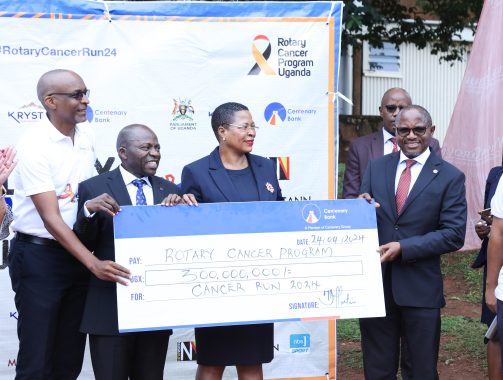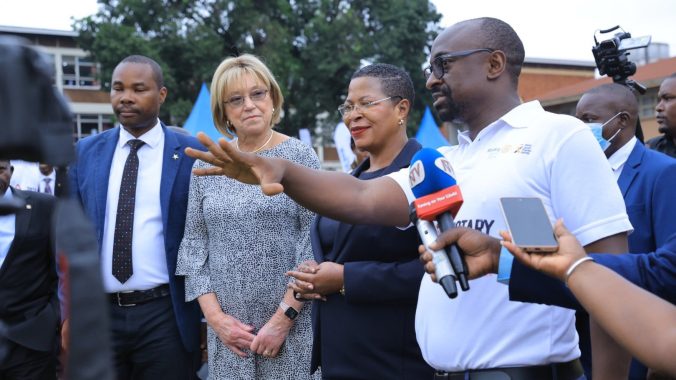As the second and more deadly wave of the COVID-19 pandemic continues to grip Uganda and many other African countries, putting everyone’s life at risk, there is greater onus on essential businesses that are in operation, to prioritize the safety of customers and the public that interact with their brands regularly.
To do this, organizations have deployed several tactics to minimize transmission and spread of the deadly novel corona virus with guidance from the relevant authorities.
We have also revamped our communication both internal and digital to emphasize safety against COVID-19 to our customers, the public, staff and other stakeholders.
In the financial sector, whereas health experts cannot directly link the spread of Corona virus through money exchanging hands, as there is no major evidence that points to it. There are however many ways in which money-related activities may accelerate its spread; top on the list being convergence of people followed by the lack of observance of all prescribed Standard Operating Procedures (SOPs) including properly wearing masks, ensuring physical distance by over 3 or more meters, good hand and body hygiene as well as avoiding gatherings or crowds.
Suffice to say, all this can be avoided if organizations and individuals embrace digital as the safest way to transact from a health-perspective as business or other activities would be carried out in a convenient and timely manner in the comfort of one’s home without the need to travel through potential risk areas to access services.
For the banking sector and the future of money, digital should continue to take the lead to ensure that people and businesses thrive on safety, efficiency and convenience.
A recent partnership between KCBU and Airtel to roll out several digital financial solutions is part of this journey. We launched new products – The Supersaver account and an Airtel float financing product, a mobile loan that gives Airtel Money Agents quick access to unsecured loans.
This is part of an ongoing process of migrating transactions from branches to digital channels and promotion of digital products. This migration is primarily hinged on making transactions efficient and convenient for the customer but also to support financial inclusion and promote business.
Our already existing digital products also include a short-term loan arrangement that allows customers to access quick unsecured loans using their mobile phones.
According to Financial Inclusion Insights (FII) Program, an increasing number of Ugandan farmers are now able to instantly send and receive money as they engage in their agricultural activities because of mobile money services. These services have penetrated rural areas, where 40% now have active financial accounts. Nearly one-half (46%) of Ugandans have financial services accounts, with mobile money leading the way to financial inclusion, as more than four in ten adults (43%) have mobile money accounts.
FII further states that, seventy-three percent of Uganda’s adults live in rural areas and nearly six in ten adults (57%) are poor. Expanding access to mobile money services is helping to facilitate much-needed financial security, enabling individuals to pursue educational opportunities and maintain their livelihoods without relying on friends or family.
This means that the demand for contactless payments (beyond mobile money), also creates the need for more uptake in other forms of finance like debit card or even online banking, especially as telecoms continue to expand their networks of stable internet across the country, bridging the gap for those in rural Uganda. With continued global exposure and collaboration, there has never been a better time for us to opt for the use of mobile phone-based payment options, online financial services and debits cards whether for buying groceries at your local “duuka” or paying utilities, healthcare, or refilling cooking gas among other things.
Today, the internet is a critical enabler of financial and other services. It shouldn’t matter whether you’re on-the-go, working from home, in self-isolation or an essential worker with a limited work break. As long as you have an internet connection and an appropriate device, you should be able to transact with your bank. The benefits of solutions like KCB’s i-bank are immense – convenience, control over your finances, 24/7 banking and full-time access to your account statements.
Currently, majority of KCB’s transactions are digital, and as a business, we are focused on growing this trend, driven by continuous innovation and new partnerships with fintechs, mobile network operators as well as internal resources.
The other quick and safe channels for us to serve our customer will be Mobile Banking, and Agent Banking.
Agency banking, a fragment of our bigger approach to bring the bank closer to the customer, is an intervention worthy taking note of. You cannot afford to wait to dice with death by relying on having customers in the banking hall in times like these. With over 1,000 Agents on the network, we believe that these are capable of serving their localities satisfactorily.
In as much as the COVID-19 pandemic is ravaging the world, it presents players in the banking sector the opportunity to exhaustively deliver innovative paperless and cashless banking options to achieve the goal of digital inclusion.
The task is upon both public and private sector players to make aware and encourage our customers to make use of the available digital banking platforms as we all strive to get rid of the Coronavirus disease.
By Michael SSekyondwa, Head of Retail, KCB Uganda
Covid, Covid















